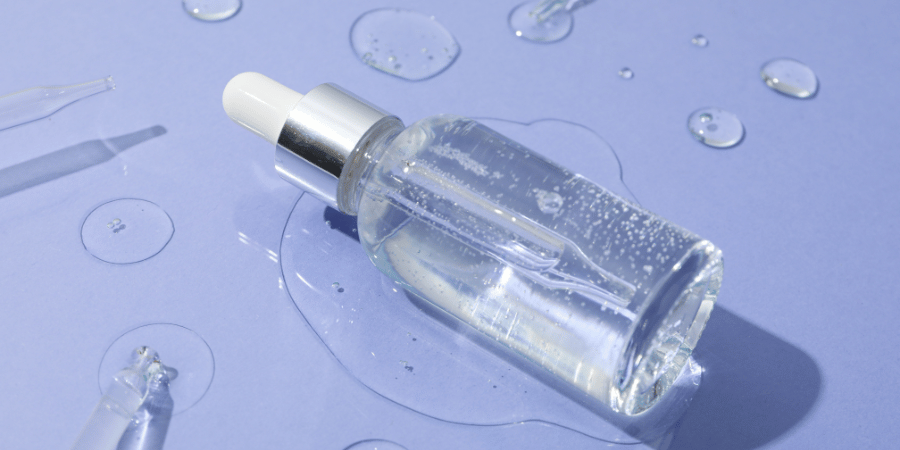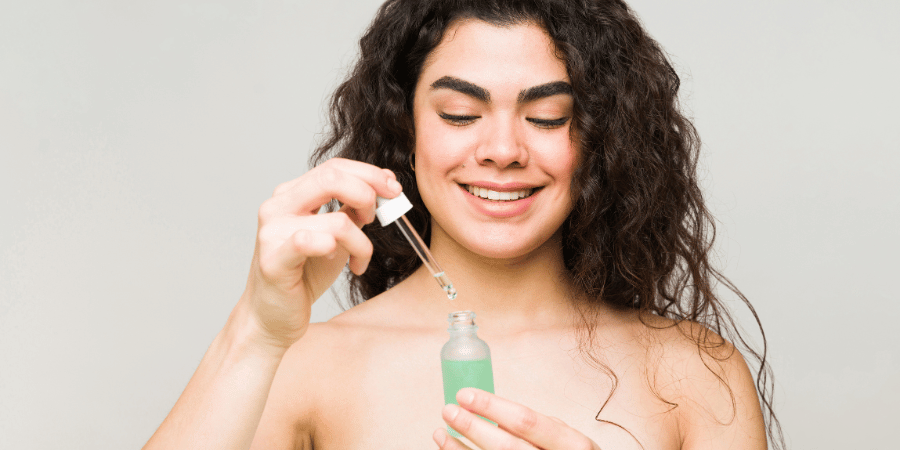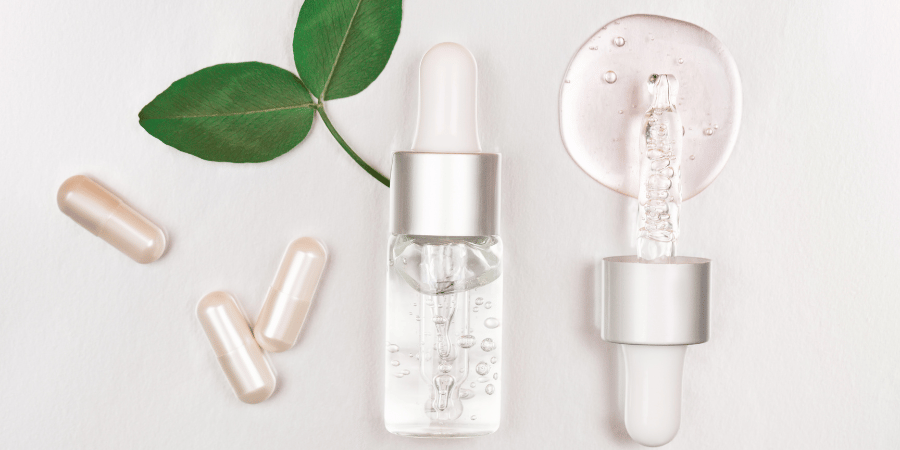Let’s talk about one of the most buzzed-about skincare ingredients today: hyaluronic acid (HA). So, what exactly is this magical ingredient? Hyaluronic acid is a polysaccharide—basically, a fancy way of saying it’s a type of sugar that naturally occurs in our bodies. Think of it as your skin’s bestie, keeping it hydrated, plump, and youthful. Unfortunately, as we age (starting around 25—ugh), our natural HA levels begin to decline. That’s why adding HA to your skincare routine is a total game-changer.
Hyaluronic Acid: What Is It?
Hyaluronic acid (HA) is a naturally occurring polysaccharide found in the human body, especially in the skin, eyes, and connective tissues. It was first isolated in 1934 from the vitreous humor of cattle. Known for its ability to retain large amounts of water, HA plays a key role in keeping the skin hydrated and elastic. It is commonly produced through bacterial fermentation and is widely used in cosmetics for its moisturizing and anti-aging properties.
| Aspect | Details |
|---|---|
| Safety in Cosmetics | Recognized as safe by the Cosmetic Ingredient Review (CIR) in 2009. A review of toxicological data found no concerns. |
| Safety in Medical Applications | Used in medical treatments, with only 144 adverse reactions reported out of 262,000 cases—most of which resolved within two weeks. These reactions were linked to injections, not topical use. |
| Safety as a Pure Substance | Not classified as a hazardous substance under chemical regulations. |
| Allergenicity | Generally considered non-allergenic. Limited data suggest potential allergic reactions, but it is not classified as an allergen. |
| Environmental Impact | No significant information available regarding environmental effects. |

Kwas hialuronowy w kosmetykach
Kwas hialuronowy to substancja nawilżająca, która chroni naskórek przed utratą wody. Uelastycznia, zmiękcza i ujędrnia naskórek. Wiążąc wodę, napina i wygładza skórę, zapobiegając powstawaniu zmarszczek. Łagodzi również stany zapalne i ma działanie gojące. Niezależnie od tego, czy walczysz z suchą skórą, drobnymi liniami, czy po prostu chcesz uzyskać promienny blask, HA jest twoim sprzymierzeńcem.
Prawdopodobnie widziałaś kwas hialuronowy na liście składników swoich ulubionych serum, kremów, a nawet produktów do włosów. I jest ku temu dobry powód! Ten gwiazdorski składnik nie jest tylko jednokierunkowy. Robi o wiele więcej niż tylko nawilża.
☝️ Hyaluronic acid is insanely hydrating because it can hold up to 1,000 times its weight in water. Yep, you heard that right—1,000 times! This means it keeps your skin super plump, bouncy, and youthful.
Different Types of Hyaluronic Acid
| Type of Hyaluronic Acid | Characteristics | Effects |
|---|---|---|
| Low Molecular Weight (LMW) | Can penetrate deeply through the outer layer of the skin. | Quickly and effectively boosts hydration in deeper layers, improves elasticity and firmness, and supports skin regeneration. |
| Medium Molecular Weight (MMW) | Works more on the surface. | Provides hydration and has anti-wrinkle benefits. |
| High Molecular Weight (HMW) | Stays within and on the surface of the skin, creating a hydrating film. | Binds water, prevents moisture loss, smooths skin, enhances elasticity, and protects against external factors. |
Hyaluronic Acid: How It Works
Dermatologists use HA to treat scars, burns, and skin damage, as well as conditions leading to skin thinning. It’s also used to fill in tissue loss caused by steroid-induced atrophy. HA speeds up healing for acne scars, fades discoloration, and smooths uneven skin texture. So, if you’re dealing with post-acne marks or other imperfections, HA can help you achieve a smoother, more even complexion.
How Does Hyaluronic Acid Work?
- Attraction – HA attracts water molecules with its hydroxyl (-OH) groups.
- Binding – Water forms hydrogen bonds with HA, creating a moisture-retaining network.
- Hydration – HA forms a protective film on the skin, preventing moisture loss.
- Plumping – Hydration fills in fine lines and wrinkles, making skin appear smoother.
- Protection – The HA film shields skin from pollution and dryness.
Why You Need HA in Your Routine
Hyaluronic acid isn’t just for your face—it’s a multitasking powerhouse that works wonders for your body and hair too! Here’s why you should be obsessed with it:
- Hydration Hero – Keeps your skin moisturized and fresh.
- Anti-Aging Warrior – Reduces the appearance of fine lines and wrinkles. Yes, please!
- Healing Power – Soothes irritated skin and speeds up wound healing.
- Anti-Inflammatory – Calms redness and inflammation—perfect for sensitive skin!
Hyaluronic Acid for Different Skin Types
One of the best things about HA is that it works for all skin types. Whether you have dry, oily, combination, or sensitive skin, HA can do wonders. It’s deeply hydrating but never greasy, making it ideal even for acne-prone skin. Plus, it’s gentle enough to provide hydration without irritation, making it a top choice for sensitive skin.
| Skin Type | Benefits |
|---|---|
| Dry | Intense hydration, improves elasticity and firmness. |
| Dehydrated | Locks in moisture, prevents dryness. |
| Sagging | Firms skin, enhances facial contours. |
| Mature | Reduces wrinkles, boosts elasticity. |
| First signs of aging | Prevents new wrinkles, protects from environmental damage. |
| Irritated | Soothes inflammation, shields against free radicals. |
How to Choose the Right HA Product
When shopping for HA products, check the concentration! Most skincare products contain up to 2% hyaluronic acid. Higher concentrations can deliver deeper hydration and anti-aging benefits, but always patch-test new products to make sure they’re right for your skin.
Hyaluronic Acid in Cosmetics During Pregnancy
Good news for all the moms-to-be! Pregnant women can safely use topical products like serums, lotions, and creams containing hyaluronic acid. The only reason to avoid them would be an individual sensitivity to any ingredient in a specific product. So, you can keep that pregnancy glow while still enjoying your favorite HA skincare!
Allergy to Hyaluronic Acid
Hyaluronic acid is a compound naturally found in the human body, especially in the skin and eyes. Since it’s a physiological substance, its use in cosmetics is completely safe. There’s no risk of an allergic reaction to HA itself, which is why allergy tests aren’t required before treatments. That makes it a super safe choice for almost everyone!
How to Pair Hyaluronic Acid for a Radiant Glow
Alright, let’s talk about how to get the most out of your hyaluronic acid products. HA plays well with others, meaning you can mix it with different skincare ingredients for even better results. Here are my favorite combos:
- Vitamin C – Boosts glow and helps fade dark spots.
- Niacinamide – Enhances hydration and soothes the skin.
- Retinol – Fights signs of aging while HA keeps skin hydrated and plump.
Try out these powerful pairings and see what works best for your skin!

Recommended Hyaluronic Acid Products
Here are some of my absolute must-haves:
- Jadwiga 1% HA Serum – Super hydrating and perfect for mixing with your favorite face oils.
- Apis Hydration Revolution – Contains four different types of HA for multi-level hydration.
- Bielenda Supremelab Hyalu Minerals – A mix of three HA types for deep, long-lasting moisture.
- Germaine de Capuccini Hydracure – Perfect for acne-prone skin, keeps hydration levels high without clogging pores.
- Retix.C Hyalumagic Serum – Features four forms of HA for intense hydration and skin barrier repair.
Sources:
- Olejnik Anna, Goscianska Joanna, Nowak Izabela. Significance of hyaluronic acid in cosmetic industry and aesthetic medicine. 2012 Jan; 66(2):129-135.
- King SR, Hickerson WL, Proctor KG. Beneficial actions of exogenous hyaluronic acid on wound healing. Surgery. 1991 Jan;109(1):76-84. PMID: 1984639.
